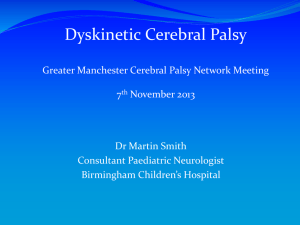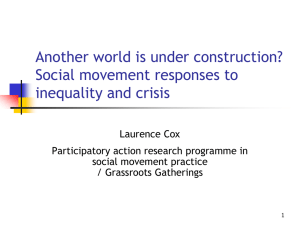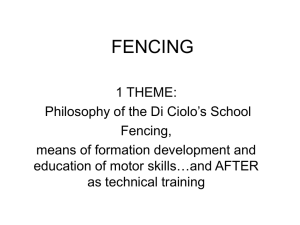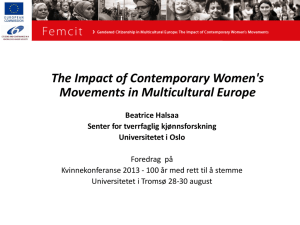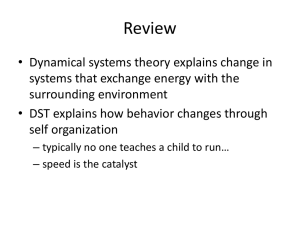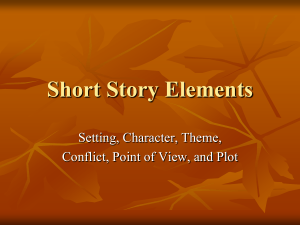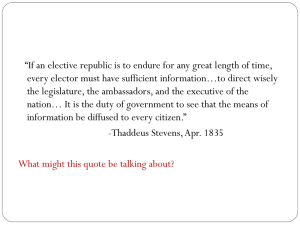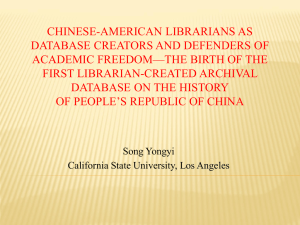Social Movements and socialism
advertisement
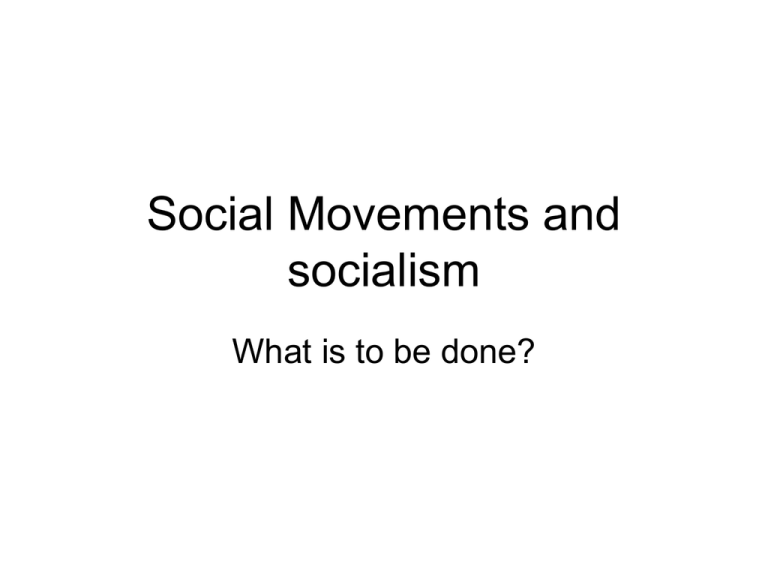
Social Movements and socialism What is to be done? Background • The biggest political fact of the last 10 years has been, on the one hand, the extrication from popular struggles of the older social movements (ANC, the civics, the SACP and COSATU), and, on the other, the ongoing revolts (service delivery, community-based, “popcorn” civics) • Until recently the ANC, COSATU etc acted as the registers of popular struggles – they no longer do so, and in the case of the ANC government, it is the object of the protests. SACP an occasional exception • There is no evidence that the ANCYL is a register of township or youth struggles • Many continue to vote for the ANC as a vehicle for individual solutions (rather than as a class – despite collective struggles against the impact of ANC policies) • This is a movement in itself but not yet for itself Why a “movement” • • • • • • • • • This is a movement – a movement of a working class, but a class that has been restructured by 20 years of neoliberalism/neo-apartheid violence – small towns, unemployed, shackdwellers, casualised workers, outside the old centres of township struggles, young, often female and black There have been more than 10 years of unabated struggles by working class communities which has neither been crushed by state repression or co-opted This movement has impacted on one another (same names, tactics and slogans); on public opinion; even on new wage negotiation rounds It has been through ebbs and flows with little continuity between one “solid formation” and a new one A movement is not the same as a national organisation with a manifesto, elected leadership and a website – although these are desirable A movement is not the same as an agreed common political platform – although this is desirable You can have the former without the latter but if you have the latter without the former then you have mere shells Movements may well occupy other initiatives and seize them – as we know in the past (from UDF to the Shidlovsky commission) This movement has not yet been able to forge its own identity or speak in its own name or compel all to address questions defined by it however (not empirical) The social distance • • • • • • What is also a defining feature of this period is the social distance of the older social movements and the left intelligentsia from the movement Some academics and many on the left fail to see their social distance (from the wc today and from past struggles) as a problem and instead transcribe their weaknesses onto the movements (they’re too “localised”, they “only want limited reforms”, they’re not a “national organisation” etc). Others draw on new academic theories to adopt their favourite model and uncritically idealise them in academic fora or want them “protected” from outside influences Alliance “left” either smugly ignore them or speak about “bringing them right” It takes 2 to maintain a social distance – the movements have themselves not crashed down the barriers and occupied the public space e.g. Tahrir Square or the role of the SA schools in the 1980s Amnesia about how the past mass movement emerged (e.g. UDF, student movement, time frames etc) Social movements globally • The world is constructed unevenly – different tempos etc • SA was at its most active in the 1980s, when Latin America, Europe and USA defeated • Latin America movements at highest point in the 1990s to 2002 (Petras says they were in decline in period of “left” governments – Chavez, Morales, Correa etc • Europe – heyday of neo liberalism in 1980s and 1990s; Europe as epicentre of “old left” – communist and social democrats – centre of theories of “new social movements” and anti-statism • Arab Spring – Egypt and Tunisia in 2010 and 2011, apparently “spontaneous” yet 10 years of social movement struggles – workplace and elsewhere • The intellectual concerns of SA largely shaped by Europe though – so these concerns have become “social movement theory” here. Academic theories of new social movements 1. Social movements are a type of group action. They are large informal groupings of individuals and/or organisations focussed on specific political or social issues, in other words, on carrying out, resisting or undoing a social change. Modern Western social movements became possible through education (the wider dissemination of literature), and increased mobility of labour due to the industrialisation and urbanisation of 19th century societies. It is sometimes argued that the freedom of expression, education and relative economic independence prevalent in the modern Western culture is responsible for the unprecedented number and scope of various contemporary social movements. However others point out that many of the social movements of the last hundred years grew up, like the Mau Mau in Kenya, to oppose Western colonialism. Either way, social movements have been and continued to be closely connected with democratic political systems. Occasionally social movements have been involved in democratising nations, but more often they have flourished after democratisation. Over the past 200 years, they have become part of a popular and global expression of dissent. (Wikipedia, 2011) 2. Social movements are thus in our view, politically and/or socially directed collectives, often involving multiple organisations and networks, focused on changing one or more elements of the social, political and economic system within which they are located.” (Ballard, Habib and Valodia, 2006, p3) 3. New Social Movements: “Indigenous movements, women's movements, Afro-Latino movements, and landless people's movements were all motivated and sustained by aspirations that derive from shared identities, and are directed against social relationships and structures that have adverse consequences for these identity groups” (Bebbington, 2003) These are present in disciplines such as sociology and political science • • • Assume some kind of “naturalness” of social order and then start to explain why the “peace” has been disturbed Those who delineate the “new” as opposed to the “old” attempt a list of features of the new which assume the “old” have no history (e.g. “single issue” vs ?; networks vs organisations; social vs political etc) All come with a set of assumptions rooted in an amnesia – both about history and theory Debates and characterisation • Attempts to characterise them “neutrally” – Movements contesting the sphere of reproduction rather than production • Attempts to talk them up – Instances of self-actualisation of the “poor” – Democratic and not top-down – Precursors for something new (movement of the movements, global networks etc) – Do not seek political power – Contrast with “old left” and “vanguardists” • Attempts to talk them down – – – – Weak and fragile Only struggling for a “slice of the pie” They’re only single-issue movements Significance exaggerated The struggle of memory over forgetting 1. Why must we be surprised by instances of self activity/social action/struggles? 2. An aversion to class; what is the working class and what does the working class struggle for? 3. Perspectives on the state? 4. Socialism? 1. Struggle/contestation is the mode of existence of society • All the features of capitalism – the state, the “market”, the “economy”, law, the family etc are all social relations contested everyday • We need to explain moments of temporary/apparent “peace” rather than why struggles happen • Struggles can be muted or intense, united or dispersed, “hidden” or overt (cf Hobsbawm and Rude), from “above” or from “below” • Much of “social movement theory” buys in to the perspectives of the big parties and unions or the right wing “end of history” ideas and World Bank ideas of states, markets and civil society 2. The working class • • • • • • • Much social movement theory conflates the working class with “trade unions” or people in jobs and accepts very conservative perspectives on these as a given Much social movement theory show little knowledge how the mass parties of the left emerged – and cannot learn the lessons of their decline How Marx came to the centrality of the working class – not via political economy The working class as vehicle for broader social change (including the ending of all classes) The working class is not just at the “point of production” and the “point of production” itself has changed over the last 30 years Capital subjects the working class to its rule across every moment in the accumulation process (reproduction, production, distribution – the realisation of surplus value) The working class in return is forged across all of these – in the real history of the class different moments have been critical e.g. cf. Britain and Germany and social democracy cf Eisenstein’s Strike! Also SA history 2. What does the working class struggle for? • To say that social movements are only struggling for a “slice of the pie” is actually praising them and not belittling them (similarly with the idea that they are “single issue movements”) • The working class does not “struggle for socialism” as a choice amongst options • Working class people daily struggle for individual access, and their access of their families, to the products of their labour • When they act as a collective, as a class then they disrupt all the social relations of capitalism Marx on the working class All previous historical movements were movements of minorities, or in the interest of minorities. The proletarian movement is the selfconscious, independent movement of the immense majority, in the interest of the immense majority. The proletariat, the lowest stratum of our present society, cannot stir, cannot raise itself up, without the whole superincumbent strata of official society being sprung into the air. 3. The state question • Wallerstein, Holloway etc – experiences of Soviet Union and SD / Labour parties in power prove the inevitability of the corruption of state power (Opposite to effect that the Paris Commune had on the left in 1871) • Intellectual silence and complicity in the neo-liberal attacks on the welfare state and state regulation of finance markets • Silence on Stalinism and its history • In SA there is a silence on the historical fight for the vote, state ownership over public enterprises, and left questions of democracy to the liberals • But Latin America and Arab Spring are once again putting the question at the centre (in both the negative and the positive sense) 4. Socialism? • • • • • • • Marx is not the founder of socialism as a goal and wrote almost nothing about “it”. Mostly he criticised those who claimed socialism as some kind of vision and found their visions scarred with their insertion in capitalism Instead he argued that socialism would “grow out of capitalism” and that socialism had become forged with the current struggles of the movement The second generation of Marxists (Lenin, Plekhanov, Luxembourg, Trotsky etc) took up this question in the context of struggles where capitalist social relations were not advanced: debates on “the bourgeois revolution” in 1905 to the April thesis in 1917 By 1917 the perspective was socialism was about workers winning political power – starting with Russia as the “weakest link” but anticipating the German revolution and generalised European-wide revolutions What such a socialism would do in the meantime was a balance of forces question Failure would mean inevitable counter-revolution. The form was not however immediate imperialist counter (because of depth of capitalist crisis during the wars) but 70 years of Stalinism which has perverted Leninism and Marxism (not only because of the bourgeois ideologues but from many of the Marxists and Leninists themselves). Marx on socialism/communism Communism is for us not a state of affairs which is to be established, an ideal to which reality [will] have to adjust itself. We call communism the real movement which abolishes the present state of things. The conditions of this movement result from the premises now in existence. (Marx, German Ideology,1845) Key challenges today • The nature of the SA social formation, the state and democracy • The changing composition and structure of the working class • The nature causes and impact of the global capitalist crisis What is to be done? • • • • • • • • • • The movements will themselves settle the academic/theoretical debates as practical questions I am addressing however an academic space here – which needs to bury “social movement theory” The failure to narrow the social distance between those who consider themselves revolutionaries and the movements is the biggest political problem of our times Challenges to both the “new” and the “old left” Movements do not need “education” but engagement as fellow activists seeking change Look again at the question of “Bowing to spontaneity” Look again at “Economism” The question of leadership and vanguards Drawing on their struggles to also pose revolutionary challenges in other spheres (breakdown the intellectual gated communities) Address the question of a restructured working class, review then nature of the SA social formation; global capitalist crisis; learn revolutionary history and theory (SA and elsewhere)


